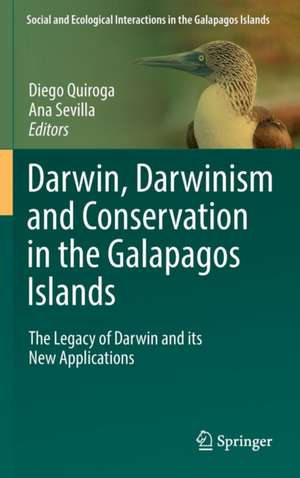Darwin, Darwinism and Conservation in the Galapagos Islands: The Legacy of Darwin and its New Applications: Social and Ecological Interactions in the Galapagos Islands
Editat de Diego Quiroga, Ana Sevillaen Limba Engleză Hardback – 11 oct 2016
Toate formatele și edițiile
| Toate formatele și edițiile | Preț | Express |
|---|---|---|
| Paperback (1) | 721.33 lei 43-57 zile | |
| Springer International Publishing – 16 iun 2018 | 721.33 lei 43-57 zile | |
| Hardback (1) | 727.18 lei 43-57 zile | |
| Springer International Publishing – 11 oct 2016 | 727.18 lei 43-57 zile |
Preț: 727.18 lei
Preț vechi: 886.80 lei
-18% Nou
Puncte Express: 1091
Preț estimativ în valută:
139.14€ • 145.67$ • 115.13£
139.14€ • 145.67$ • 115.13£
Carte tipărită la comandă
Livrare economică 07-21 aprilie
Preluare comenzi: 021 569.72.76
Specificații
ISBN-13: 9783319340500
ISBN-10: 3319340506
Pagini: 190
Ilustrații: XV, 164 p. 6 illus. in color.
Dimensiuni: 155 x 235 x 11 mm
Greutate: 0.43 kg
Ediția:1st ed. 2017
Editura: Springer International Publishing
Colecția Springer
Seria Social and Ecological Interactions in the Galapagos Islands
Locul publicării:Cham, Switzerland
ISBN-10: 3319340506
Pagini: 190
Ilustrații: XV, 164 p. 6 illus. in color.
Dimensiuni: 155 x 235 x 11 mm
Greutate: 0.43 kg
Ediția:1st ed. 2017
Editura: Springer International Publishing
Colecția Springer
Seria Social and Ecological Interactions in the Galapagos Islands
Locul publicării:Cham, Switzerland
Cuprins
Foreword.- 1.Darwin’s Galapagos Myth.- 2.On the Origin of Species and the Galapagos Islands.- 3.The Galapagos Islands and the Ecuadorean State: Early Encounters.- 4.Darwinians, Anti-Darwinians and the Galapagos (1835-1935).- 5.Mythologizing Darwin’s Islands.- 6.Mythologizing Darwin’s Islands.- 7.Darwinism in Latin America: Reception and Introduction.- 8.The Charles Darwin Foundation: some critical remarks about its history and trends.- 9.Darwin, Emergent Process and the Conservation of Galapagos Ecosystems.- 10.Darwinian Emergence, Conservation and Restoration: Novel Ecosystems and Hybrid Environments.
Recenzii
“This thought-provoking work will appeal to environmentalists, evolutionists, and historians of natural history. Summing Up: Recommended. Upper-division undergraduates and above; researchers and faculty.” (J. S. Schwartz, Choice, Vol. 54 (9), May, 2017)
Notă biografică
Diego Quiroga got his B.A. at the University of California Berkeley and his M.A. and Ph.D. at the University of Illinois, Urbana-Champaign in anthropology. He has done research on different areas of Ecuador and has written on diverse topics including medical anthropology, development, conservation and political ecology. Besides researching issues such as fisheries and tourism in the Galapagos, Diego is also studying the amazon forest and examining the changes and transformations that indigenous people in the area are experiencing and their response to these new challenges. He is the cofounder of GAIAS, the Galapagos Academic Institute for the Arts and the Sciences and the current director of the Center which is a branch of the Universidad San Francisco de Quito in San Cristobal, Galapagos. Diego is also involved in the administration of the program and teaches classes for the local Galapagos students and in for different exchange programs in collaboration with many universities around the world.
Ana Sevilla is a research associate at the Universidad San Francisco de Quito. She completed her Ph.D. at Facultad Latinoamericana de Ciencias Sociales and did her postdoctoral studies at Leiden University. Her research interests lie in the area of the history of science; she studies processes of knowledge production in non-European spaces of modernity. Ana has focused her explorations on the reception of Darwin´s ideas in Ecuador and Latin America. She is also involved in the Galapagos tourism industry. She has worked in one of the most important tourism operators of the Galapagos in the area of research and development of new products.
Textul de pe ultima copertă
The book explores how Darwin´s legendary and mythologized visit to the Galapagos affected the socioecosystems of the Islands, as well as the cultural and intellectual traditions of Ecuador and Latin America. It highlights in what way the connection between Darwin and the Galapagos has had real, enduring and paradoxical effects in the Archipelago. This Twenty Century construct of the Galapagos as the cradle of Darwin’s theory and insights triggered not only the definition of the Galapagos as a living natural laboratory but also the production of a series of conservation practices and the reshaping of the Galapagos as a tourism destination with an increasingly important flow of tourists that potentially threaten its fragile ecosystems. The book argues that the idea of a Darwinian living laboratory has been limited by the success of the very same constructs that promote its conservation. It suggests critical interpretations of this paradox by questioning many of the dichotomies that havebeen created to understand nature and its conservation. We also explore some possible ways in which Darwin's ideas can be used to better understand the social and natural threats facing the Islands and to develop sustainable and successful management practices.
Caracteristici
Examines past and present applications of Darwinian principles to the study of human societies Analyzes the role of agency as an important factor in the creation of social institutions Explores the way Darwinian principles of emergence, diversity, natural selection, and uncertainty can be used to manage natural resources in sustainable ways


























